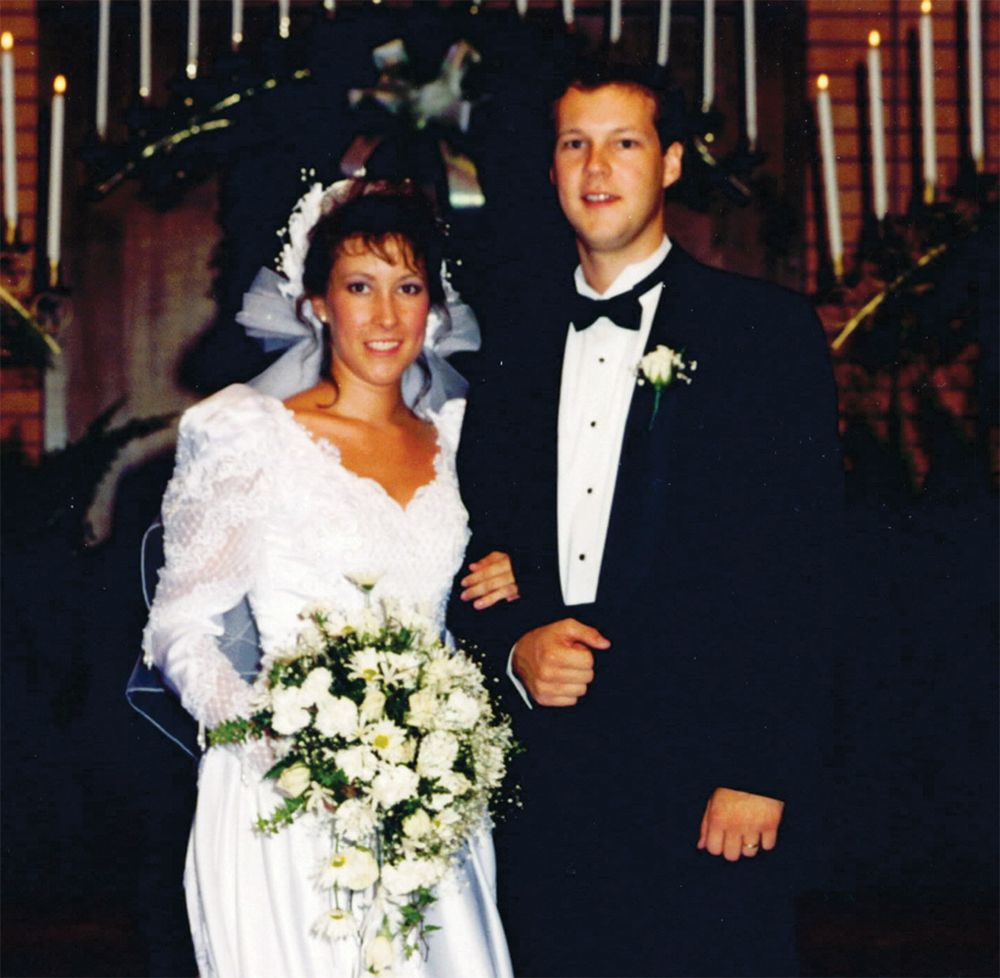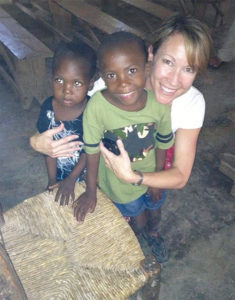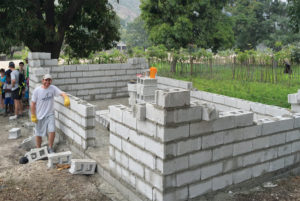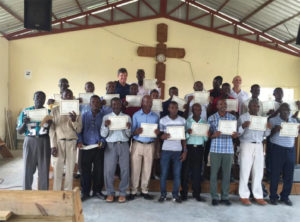By KATIE EUBANKS

Stan and Jewell Buckley laugh during their interview with MCL.
Stan Buckley had plans … But God!
From lawyering to pastoring to starting a nonprofit
In July 2010, as senior pastor at First Baptist Jackson, Stan Buckley had an appointment that would change his life.
“I still don’t know how (this man got a meeting with me),” Stan recalls. “I didn’t want to see him. He opened his laptop, and he showed me pictures of the devastation (from the 2010 earthquake) in Haiti.
“I had plenty of stuff to do. I didn’t need these projects,” Stan says.
“I looked at his pictures, had a little prayer for him, patted him on the back and sent him on his way, thinking I was through with this, and I could get back to the stuff I wanted to do. But the Holy Spirit had a different idea.”
Thirteen months later, Stan would transition from leading one of Jackson’s oldest churches to running a nonprofit startup. But this wasn’t the first time God had interrupted Stan’s life plan.
From lawyer to preacher
He’d seen Jewell Adams on campus before. Now she was in his journalism class at Southern Miss. It was spring of 1988.
“I called her big sister in her sorority (and found out Jewell was single). I said, ‘Don’t say anything to her, but I’m probably going to ask her out.’ Of course she went right down the hall and told her,” he says –now sitting next to his wife of nearly 31 years.

Jewell and Stan married on July 15, 1989, at Petal-Harvey Baptist Church in Petal.
Stan and Jewell were married the summer after his first year at Mississippi College School of Law. After he finished, the Buckleys moved back to Hattiesburg and joined Temple Baptist Church, where they taught children’s Sunday school.
They bought their first house. Stan practiced insurance defense and later got involved in asbestos litigation on the defense side. Jewell worked as a recruiter for William Carey University, then called William Carey College. In 1993, she gave birth to twins, Adam and Neal, and became a stay-at-home mom.
The following year, “I began to sense that the Lord was leading me … into full-time church work,” Stan says.
“But I had a wife and two children.”
“And I was at home,” Jewell notes. Stan was their only income source.
Initially, “(Jewell) was not excited” about Stan changing careers, he says. “She had married a lawyer, not a preacher.”
Jewell wanted her husband to be sure about this move. He’d only been practicing law for three years.
Finally, after lots of prayer, it became clear: “If I don’t do this, my soul’s going to die,” Stan says.

Jewell and Stan with the kids at Summerland Baptist Church near Taylorsville, the first church Stan pastored. Kids, from left: Adam, Anna and Neal.
Since New Orleans Baptist Theological Seminary was the closest Southern Baptist seminary, he commuted there to work on his master’s of divinity while practicing law part time.
A few months later, Stan got a call from Taylorsville, about 45 minutes from Hattiesburg. A church there had heard about him from one of his professors and needed a preacher to fill in at two upcoming services.
“I was in trouble, because I only had one sermon,” Stan says. But he did well enough that the church asked him to be their pastor.
The family moved to Taylorsville, where, Stan says, “there were no houses around the parsonage — “
“There was one,” Jewell says. “It had a pig on the porch.”
“Oh, yeah — it was a big pig,” he remembers.
Pastoring paid half as much as lawyering. “But we never missed (having) anything,” Jewell says. She gave birth to their daughter, Anna, in Taylorsville, so they had three children under 3 years old. On days that Stan had class, he’d drive two and a half hours to New Orleans, attend classes, and drive two and a half hours back, while Jewell held down the fort.
“She was beyond a trooper,” Stan says. “But those were four of the most wonderful years of our lives.”
Next the Buckleys moved to Decatur, Mississippi, a similarly small town where Stan also preached. He completed his master of divinity while living there in 1998. (He later finished his doctorate of ministry at New Orleans as well.)
Then in July 2003, First Baptist Jackson called.
‘I don’t wanna move!’
First Baptist Jackson had 5,000 church members — about five times the population of Decatur, where Stan was pastoring.
After meeting with FBCJ’s pastor search committee, he and Jewell brought the kids to Jackson and drove them around the church building. The boys were 10 and Anna was 7.
“Then we drove down High Street to the parking lot and said, ‘You know that church we were just looking at? They want your dad to come be the pastor,’” Stan recalls.

Stan preaching at First Baptist Jackson.
Cue the crisis.
“Two of them just started screaming and crying, they were so upset. Anna was getting out of the car,” Stan says.
“Neal is just sitting back there like nothing’s going on, and the other two are going nuts. Then one of them yells, ‘I don’t wanna move!’ and Neal goes, ‘MOVE?’ Then he starts screaming.”
Finally, the Buckleys informed the kids that Jackson had a Chuck E. Cheese. That turned things around.
Three thousand people showed up at FBCJ to hear Stan preach as a candidate for senior pastor. The church had been without a permanent pastor for three years, so “Donald Duck could’ve come preach, and they would’ve had a big crowd,” Stan says.
The church voted unanimously to hire Stan, and the family moved to metro Jackson, where the kids adapted well, Jewell says. “We kind of just fit in.”
At First Baptist, “I got the opportunity to do things I’ve never done before,” Stan says. “The biggest challenge was probably administrative. I went from four pastors on staff to 30. I went from a budget of maybe $600,000 to $9 million. It was a steep learning curve.”
Those challenges prepared him for what was coming next.
‘But that’s impossible’
After his fateful meeting in July 2010, Stan couldn’t forget the photos he’d seen of people living in “those dreadful tent cities” in Haiti, he says.
The Holy Spirit told him to go to Haiti, so he went, with a couple of folks from FBCJ.
The first tent city he entered was specifically for amputees.

Stan with a little boy in Haiti.
“Everywhere I looked there were missing hands and feet and arms and legs. It was awful. And I remember getting away from my little group that I was with, just to process what I had seen,” Stan says.
He looked up and saw a young Haitian man walking toward him. Stan didn’t speak Creole, but the man, Thomas, spoke great English. He was not missing any limbs.
“Why are you here in this tent city?” Stan asked.
Thomas said the earthquake had destroyed his home and his school, killed his father, and made his mother an amputee.
Stan asked what the tent city was like. The answer: not good. Stan asked how Thomas survived mentally and emotionally.
“He looked at me and said, ‘Well, there’s a book in the Bible called Ecclesiastes. … In that book, there’s a time for everything. There’s a time to laugh, and there’s a time to cry. Sometimes we laugh, and sometimes we cry.’” No, Thomas did not know Stan was a pastor.
Finally, Stan asked what he now realizes was not the smartest question:

“I just loved being around the people,” Jewell says of visiting Haiti with BGM.
“I said, ‘Thomas, if it were possible for you and your mom and your family members to … move into a brand-new community where there was decent housing, you could get medical care, you could finish your education, you could have clean water and food — do you think you’d be interested?’”
Thomas said he’d love to move. “But that’s impossible.”
Then, “in a split second, the Spirit of God spoke to my spirit two words: ‘But God,’” Stan recalls.
“In a matter of seconds, my mind races through the Bible and all the times that God has shown up in impossible situations, because that’s when He does His best work.”
Stan thought of God parting the Red Sea, shutting the lions’ mouths for Daniel, saving Daniel’s friends from the fiery furnace. Then he thought of Ephesians 2, which describes “what I think is the most impossible situation any person faces. Paul says we were dead in our trespasses and sins. We’re just dead people walking. Spiritually dead — with no hope, no future. And here’s the deal, there’s nothing you can do about it. And then (Paul) says, ‘But God … ’”
Stan knew God could do the impossible in Haiti, just as He had done for all believers in Christ.
“And then I turned around and left, because my ride was leaving.”
‘Are you sitting down?’
Back in his office at First Baptist after returning home, Stan asked God what to do, and God started giving him a vision for what would become But God Ministries. But he needed funding.
So in October, he had a house built — one that would fit onstage at First Baptist.
“(It was) like 18 x 15 x 12 (feet). I thought we were going to just build these houses and ship them down (to Haiti),” Stan says.

A home under construction by But God Ministries in Haiti.
Today, hearing those initial plans rehashed makes Jewell do a double-take. “I just now realized, you were just going to build houses,” she says to Stan. What God did was way bigger.
From the pulpit, Stan shared photos from his trip to Haiti, “our vision, and the biblical rationale for it,” he says. The church set a five-month timeline to raise money. In March, the big day came.
“The counting committee was going to count (the money) that Sunday afternoon and call me. But 1 o’clock came, and 2 o’clock came, and they never called. Then it was time for me to leave and get down there for the evening service. I figured we didn’t get very much … and I was going to have to announce that, and it would be embarrassing.”
He called on his way to church. The man who answered asked, “Are you sitting down?”
“Well I’m driving …”
“Well, you might ought to pull over.”
The church had given $500,000.
Then another $100,000 came in “from all over,” Stan says, including folks who watched FBCJ’s services on TV.
That $600,000 was the seed money for But God Ministries. Most nonprofits don’t launch with anywhere near that amount.

Haitian pastors pose with certificates earned after a week of pastor training under But God Ministries.
BGM went to Haiti and started building its Hope Center — a compound containing medical and dental clinics, dorms for visiting volunteer teams, a kitchen, and missionary housing — in May 2011. Stan was scheduled for a sabbatical from FBCJ, so he was in Haiti to oversee initial efforts.
Soon it became clear that God wanted Stan to pour his energy into BGM full time. He resigned from First Baptist — one year after his conversation with Thomas in that tent city.
Immediately upon leaving FBCJ, Stan was able to “fill-in” preach for whatever churches needed him, without any other pastoral responsibilities. His experience pastoring First Baptist gave him extra credibility: “I didn’t have to explain that I wasn’t in a cult,” he says.
“And if they were going to invite me to preach, they were going to hear about Haiti.”
FBCJ voted to pay Stan’s salary and benefits for a year after he left, which allowed him to focus on But God Ministries. He had the names of 600 families who had already donated to the work. Several FBCJ members became BGM board members, “though not anymore,” Stan says — except Buddy Huff, who today is chairman of the BGM board. (Buddy also chaired FBCJ’s pastor search committee that found Stan!)
Now BGM has 120 employees in Haiti and 20 in Mississippi, and seven missionaries in Haiti (at one point they had nine). Stan attributes his ability to manage all this to FBCJ.
“First Baptist showed me (how to run a large organization).”
‘Every time, He is faithful’
But God Ministries works within seven SPHERES as they help build sustainable communities:
S – spiritual
P – physical
H – H20
E – education
R – roofs
E – economic development
S – soil
As the organization’s efforts have grown, many churches, college students and professionals have donated, volunteered, or both. Doctors offer their time free of charge at BGM’s medical clinics in Haiti. A team of Georgia Tech engineering students made the entire Hope Center solar-powered in four days.
“It’s just a matter of trusting God, having faith, and I’ve learned that every time, He is faithful,” Stan says.

Children dance at the Jonestown Family Center for Education and Wellness, where But God Ministries operates a toddler program and Montessori school.
After building two sustainable communities in Haiti, BGM expanded to Jonestown, Mississippi, near Clarksdale, in 2016. “We have 12 full-time staff (in the Delta), all from Jonestown, and they are killing it,” Stan says.
BGM runs a Montessori school and dental clinic in Jonestown and is scheduled to start construction there June 5 on a 4,000-square-foot economic development center where businesses can set up shop — including a local company that BGM helped incorporate, which will bag screws for companies like Capital Bolt and Screw out of Ridgeland.
Ultimately, BGM wants the communities it serves to rely on Christ and take ownership of their own future.
“Our motivation is not to be anybody’s savior, but to do what God has called us to do,” Stan says. “We want local leadership, and we don’t just give lip service to that. We give them decision-making authority.
“We believe it’s important to ask people what they think is needed, instead of doing what you think is needed.”
Leaders in the Delta and Haiti have stepped up during the COVID-19 coronavirus pandemic, as BGM’s missionaries to Haiti flew home and volunteers stopped coming.
“This has forced us to find out, ‘Have we trained local leaders effectively?’ And the answer is a resounding yes,” Stan says. Meanwhile, Mississippi staff meetings were happening via video chat at press time, and the Jonestown Montessori school held a socially distant outdoor graduation.
BGM has lost about $400,000 — and will probably lose $200,000 to $300,000 more — in fees usually paid by missionary teams, Stan says. However, because of recent civil unrest in Haiti, “we set the budget up this year, not knowing about COVID-19 … assuming we’d have no (missionary) teams.”
Once the pandemic has flattened, the organization plans to announce an expansion into another Delta community.
“We have our funding for the first house,” Stan says. “We want to help transform towns all over the Delta.”
‘You don’t know the Christians I know’
Stan loves that But God Ministries lets him put all of his education, skills and experiences toward one effort. He also loves seeing believers give sacrificially of their time and resources.
“God’s people are the best,” he says. “Sometimes people talk about the church negatively, and I think, ‘You don’t know the Christians I know.’”
When asked for advice for anyone looking to start something new — whether a nonprofit, a business or a ministry — Stan said to trust God for His timing; tell your story repeatedly (without always asking for money); and, “you need a plan,” he says.
“If you’re in it for the long haul, you need an organizational plan and a financial plan.”
Of course you can plan all you want, and God still might redirect you — as Stan found out three years into his legal career.
Jewell sums it up: “Just know it might not go according to (your) plan.”

The Buckleys at Thanksgiving 2017. Standing, from left: Neal, Adam and Stan Buckley. Seated, from left: Anna and Jewell Buckley.